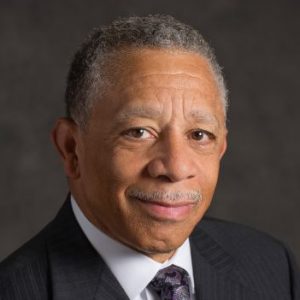Podcast: Play in new window | Download

This week we are honored to have as our guest, the legendary John W. Bluford III. Mr. Bluford is a nationally known healthcare innovator who has been recognized by Modern Healthcare and Becker’s Hospital Review as one of the Most Influential People in Healthcare. Mr. Bluford is the Founder and President of the Bluford Healthcare Leadership Institute (BHLI) – a nonprofit organization focused on value-based care leadership to eliminate health care disparities. BHLI provides an intense professional development program designed to expose undergraduate scholars with exceptional leadership potential to today’s challenging healthcare landscape, cultivating them for future leadership roles where they will serve to eliminate disparities in healthcare.
This Institute was created by John Bluford as a way to advance health equity in today’s healthcare system by sponsoring, mentoring, and coaching underrepresented talent for healthcare leadership and creating opportunities for the emerging leaders to improve health outcomes for minority and vulnerable populations. In this episode, you are going to learn from John Bluford how “Culturally Competent Leadership to Eliminate Disparities in Healthcare.”
Mr. Bluford currently serves on the Board of Trustees for Western Governors University – the leading online university in the country with a College of Health Professions that is deeply involved in the provision of workforce readiness to deliver on the promise of high value, high quality care that delivers equitable outcomes for all.
Episode Bookmarks:
01:45 Introduction to the legendary John W. Bluford III, MBA, FACHE
03:10 The Bluford Healthcare Leadership Institute (BHLI) program’s commitment to culturally competent leadership
07:45 Lessons learned from a 6-week experience at Harvard University that informed a new way of thinking about healthcare
09:00 The rewarding experiences as a mentor while serving as a preceptor for graduate students
10:00 Mr. Bluford never mentored minority students in 12 years as a preceptor because there weren’t any at the time!
11:00 A vision to create a more diverse pipeline of healthcare administration students
12:00 “Our mission is to create leaders of the future that will eliminate health care disparities among minority and vulnerable patient populations over the next two generations.”
13:00 The impact of BHLI alumni leaders who have completed the program
16:00 The observance of Black History Month and the cultural zeitgeist for civil rights and social justice has been awakened in the collective consciousness of all ethnicities
17:30 Why institutional racism will take generations to fix because it is so deeply embedded in our country’s history
18:40 “The accomplishments of Black Americans should be celebrated routinely just like everyone else. Black history is American history and should be treated as such.”
20:45 How the CMS Innovation Center is integrating health equity into the design and reengineering value-based payment models
22:15 The elevation of national consciousness regarding the existence of health disparities
22:45 “We can’t fix the problem without realizing that there is a problem. Health care disparities do, in fact, exist.”
23:00 The need for strong, pervasive leadership in healthcare, society, and government to overcome the systematic perpetuation of racism
24:20 The role of hospitals in addressing health equity and population health in the communities they serve
26:45 Mr. Bluford discusses the importance of culturally competent leadership, reflecting on lessons learned from his hospital administration career
28:00 Understanding the culture of communities and how socioeconomic determinants of health impact care outcomes
29:50 Love, hope, and compassion needed in population health leadership
30:30 Case management of patients with chronic disease is more effective when you understand SDOH barriers
31:40 “You really don’t know a patient until you go to that patient’s home.”
33:30 Understanding employees is just as important as understanding patients (ex: ensuring financial literacy for employees)
35:45 The capital intensity of SDOH investments and the responsibility of the health system (versus the role of government or CBOs)
38:00 The emergence of partnerships between hospitals and community benefit organizations
39:20 “Common good” is a more appropriate term than “public good” because the private sector has a responsibility to address health equity
40:15 Referencing Governor Leavitt and his questioning of who will take the lead in addressing health equity
42:00 Mr. Bluford casts a vision for how the elimination of health disparities to create community health, economic prosperity, and intergenerational wealth
44:00 How public policy and education shapes the direction of society
45:00 Great healthcare leaders who unite people (ex: Nicholas Tejeda, Patricia Maryland, Lloyd Dean, Kevin Lofton, Kathleen Sebelius, and Mike Leavitt)
45:30 Overcoming the pandemic is important because “there will not be economic health until there is public health”
47:30 How the WGU College of Health Professions provides scalable educational programs that provide pathways to establishing competency in population health and health equity
48:30 How Higher Education can better serve underserved learner populations to build a more qualified, culturally-competent healthcare workforce
50:00 The importance of early childhood education to build individual accomplishment and community prosperity
51:30 An example of education empowerment of employees that made an economic impact
53:30 The inaccessibility of higher education due to extremely high tuition costs
55:00 The need to hardwire conformance to social justice and health equity within the health administration profession
56:30 Diversity, Equity, and Inclusion (DEI) leaders in healthcare organizations need to be in the C-Suite
61:00 The role of technology in transforming our fragmented, expensive, and inequitable healthcare system and “bridging the digital divide” within underserved communities
62:30 The caution of health information technology in that it should not replace human relationships in the health care setting
